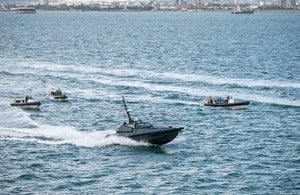UK Beach Landing Trials Help to Develop AI Capabilities
A large-scale beach-landing exercise on the Hampshire coast has been used to collect data on new cutting-edge AI products for the UK Ministry of Defence. The Defence Science and Technology Laboratory (Dstl) 5-day exercise involved 130 Royal Navy and Army personnel, 13 craft, unmanned aerial vehicles, and more than 50 cameras and sensors to record data. The UK MoD described the exercise as one of the largest maritime artificial intelligence data capture trials undertaken. The participants battled 40-knot winds and undertook the boarding and un-boarding of vehicles to gather data representative of behavioral traits. Minister for Defence Procurement, Charles Maslen commented on the trials:
“This was an ambitious and challenging trial which builds on the experience and expertise gained during the previous land-based exercise. Conducting a trial with sensors spanning three domains – land, sea and air…Data generated by the trial will enable MOD and industry partners to develop new AI products for Defence, helping keep UK forces safe and delivering operational advantage. Being able to guarantee the integrity of the data underlines MOD’s commitment to the ethical, safe and responsible use of AI.”
Data collected during the trial varied including visual, radar, and sonar. The exercise also saw the beach landing being conducted in a military style and then in a deliberately chaotic way to provide a wide sample of data. The trial was conducted in collaboration with 12 industry and international partners of the UK ahead of the Government’s AI Summit. The summit concludes today at Bletchley Park in Buckinghamshire. Best known for being the home of the Enigma code breakers during the Second World War. James Cartlidge commented on the trials and the use of AI:
“Investing in new technology provides our Armed Forces with the tools they need to stay ahead of emerging threats and ensures our national security in an ever-evolving technological landscape. Innovative, data driven exercises like this demonstrate how AI can enhance our military capabilities, enabling us to respond more efficiently to the threats of today and tomorrow.”

